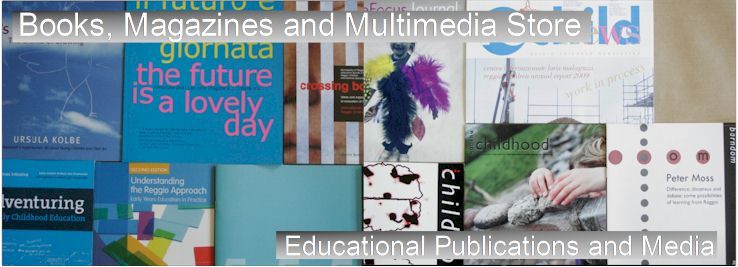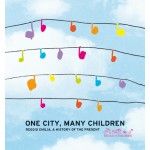Sightlines' Store -
History
Along the Levee Road
The history and identity of the Municipal Preschool Centro Verde Martiri di Villa Sesso narrated by the the people who participated in its creation. The book tells the story of an educational community over almost half a century (1945 -1997)
Introduction - Sergio Spaggiari
Our First 26 Years - Loretta Giaronni
Our School as part of the Reggio Emilia Experience - Max Ghiradi
The Centro Verde - the children's thoughts and words
Publisher: Reggio Children (2002)
Each One Must Shine
The Educational Legacy of V.A. Sukhomlinsky: “the most influential Soviet educationist during the 1960s and 1970s”
by Alan Cockerill
My Heart I Give to Children
Vasily Sukhomlinsky
Sukhomlinsky's account of how he educated young children in a Ukrainian village during the aftermath of the Second World War.
Not Just Anyplace DVD
The documentary film on the history of Reggio Emilia’s municipal centres for early childhood, with historical pictures and interviews with the protagonists.
The narrative of more than a century of educational history.
Directed by Michele Fasano
Produced by Reggio Children with the International Association Friends of Reggio Children, the Emilia-Romagna Region and the Municipality of Reggio Emilia
English translation by Gabriella Grasselli and Leslie Morrow
2002, DVD, running time: 72’
One City, Many Children
This recounts the story of the birth and development of Reggio Emilia's early years services, the nido and scuola d'infanzia. It brings together the voices and thoughts of many 'protagonists' and which refers to many sources.
A collective autobiography, an impassioned history that weaves with other histories, in a long and subtle skein of what Loris Malaguzzi called threads of silk: "A history made in this way could pass for a history that has travelled down the years and seasons without a cloud... Instead experiences of this kind, so anomalous, always walk on threads of silk." (Loris Malaguzzi, 1993)
The narrative is developed through a number of broad themes: city and families participation, the active role of women and women's movements, the politics of education in the city's municipal administration, the ties between pedagogy and politics, the originality of pedagogical thinking of Loris Malaguzzi and of the Reggio Emilia education project, and the strongly international identity of what is a local experience.
These themes, all topical and capable of generating new questions on education, on the role of schools, and as their highest aspiration, on the culture of children and human beings, are explored more deeply through contributions and considerations from architects, atelieristas, designers, academics, philosophers, photographers, teachers, pedagogues and pedagogistas, poets, film directors, scientists, writers and historians: the theory of the hundred languages of children here shapes the construction of the narrative form. Certainly, a book which takes sides, on and by the side of all children.
With interviews and texts by Renzo Bonazzi, Simona Bonilauri, Ettore Borghi, Jerome Bruner, Antonio Canovi, Luciano Corradini, Gunilla Dahlberg, Graziano Delrio, Paul Ginsborg, Loris Malaguzzi, Carla Rinaldi, Vea Vecchi. Edited by Rolando Baldini, Ilaria Cavallini, Peter Moss and Vania Vecchi. English translation Jane Mc Call.
Seeking Truth: Sixty Years in Early Childhood Education - Wendy Scott
“Educators should guard against over-concentration on formal teaching and the attainment of a specific set of targets”. the Rumbold Report ‘Starting with Quality’ 1990
In a paper which we are publishing today for a general readership, Wendy Scott O.B.E brings much to our attention in a rounded reflection on her sixty years of experience and advocacy in early education. The highs, principles, histories of morally committed pioneers; developing democratic early educational practice despite the disinterest of wider society; the frustrations and volte-faces of policy and ministers. She highlights the need for educators to maintain vigilance and articulate ‘what quality is and should be’ in the face of seas of change and ignorance in recent and contemporary times – and from her own experience reminds of the need for individuals to find their ways to keep rooted and also open.
Wendy Scott is an early years teacher with extensive experience in the PVI sector as well as schools. Headship of a demonstration nursery school was followed by a senior lectureship at Roehampton University, where she co-ordinated the original advanced diploma in multi-professional studies.
Wendy has been an early years and primary inspector in London, and has worked across England as an OFSTED Registered Inspector and trainer. She led The British Association for Early Childhood Education and chaired the national Early Childhood Forum before becoming a specialist adviser to the DfES, and working abroad with the British Council and UNICEF. She is has been President of TACTYC, the Association for Professional Development in Early Years, and has judged the Nursery World Nursery of the Year competition since 2008. She was awarded an OBE for services to education in 2015.
“I learned a great deal from the children, families and communities in London’s Docklands and the East End where I started teaching in 1961. Conditions were not much better than those faced by the McMillan sisters in Deptford half a century earlier. Children played on unreconstructed bomb sites, and many, including immigrant families, lived in difficult conditions. My college training had not equipped me with necessary knowledge about bed bugs, or prison visiting, so I had a lot to learn …”
There is no purchase cost: please complete the order process and ignore comments about payments. You will receive an email which includes a download link.
The Hundred Languages of Children - Catalogue
Catalogue of the exhibition 'The Hundred Languages of Children' that has been travelling successfully for many years around the world.
The book, with the contributions by different authors, presents through a rich and diversified documentation the evolution of the pedagogical experience in Reggio Emilia and Loris Malaguzzi’s thinking.
With contributions, among others, by Giulio Carlo Argan, Andrea Branzi, Jerome Bruner, Paola Cagliari, Tullio De Mauro, Jurij Ljubimov, Loris Malaguzzi, Clotilde Pontecorvo, Carla Rinaldi
Edited by Tiziana Filippini and Vea Vecchi; graphic design by Rolando Baldini and Vania Vecchi
Published by Reggio Children









